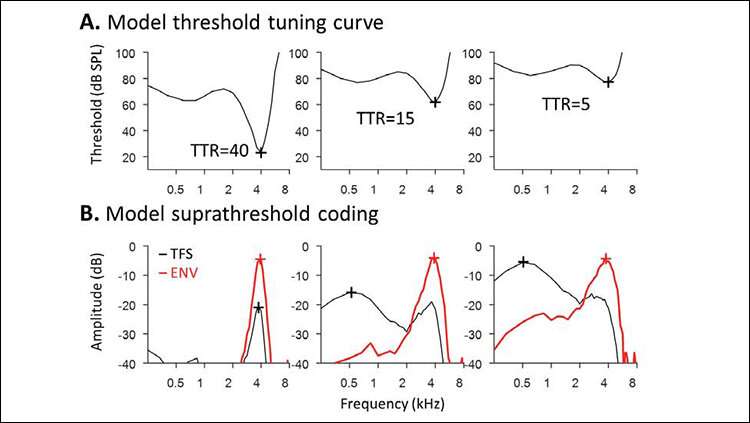How noise and age affect brain's sound processing

Hearing loss is so common in today's society, especially in older individuals, that many people question the use of doing anything to protect their hearing from noise and loud sounds. But it turns out the source of hearing loss may have a large impact on a person's ability to understand speech and enjoy music.
That's the result of a new study from researchers at Purdue University and the University of Rochester that was recently published in the Journal of Neuroscience.
The study measured differences in neural processing of sound in chinchillas between the two most common sources of hearing difficulty: noise trauma and age-related metabolic loss. It was led by Kenneth Henry, who was a National Institutes of Health postdoctoral fellow at Purdue and is now an assistant professor in the University of Rochester Medical Center's Department of Otolaryngology; and Michael Heinz, a professor in speech, language and hearing sciences and biomedical engineering in Purdue University's colleges of Health and Human Sciences, and Engineering.
The researchers found that noise trauma causes substantially greater changes in neural processing of complex sounds compared with age-related metabolic loss, potentially explaining large differences in speech perception commonly seen between people with the same clinically defined degree of hearing loss based on an audiogram.
Metabolic loss is age-related deterioration of the electrochemical gradient—the ear's "battery"—in the inner ear, and happens naturally as one gets older. NIHL is caused by physical trauma to various parts of the ear, causing scattered damage to and loss of delicate sensory hair cells within the cochlea. The trauma can be caused by a one-time event such as an explosion or a long-term event such as using heavy machinery without any ear protection.
"For complex sounds like speech or music, it is worse to get a hearing loss from noise exposure than from age; luckily noise exposure is preventable," Heinz said. "Although these two types of hearing loss are currently categorized together in clinical audiology, these results suggest the need to develop specific treatments, such as different hearing-aid amplification strategies, for each type of loss."
There are several takeaways to the study, Heinz said, including minimizing noise overexposure, public health discussions on noise prevention strategies, and personalized or precision medicine approaches to audiological diagnosis and treatment in the future.
"Avoiding exposure to loud sounds is the best prevention, such as limiting the earbud volume with your smartphone to one-half to two-thirds of the maximum. If someone else can hear your music through your earbuds, it is way too loud," Heinz said. "Other simple strategies exist, such as wearing ear plugs when attending a sporting or music event or when mowing the lawn. Ear plugs or ear muffs are also easy solutions in loud work environments, which are regulated by federal guidelines for required hearing protection."
More information: Divergent Auditory-Nerve Encoding Deficits Between Two Common Etiologies of Sensorineural Hearing Loss, JNeurosci (2019). DOI: 10.1523/JNEUROSCI.0038-19.2019


















